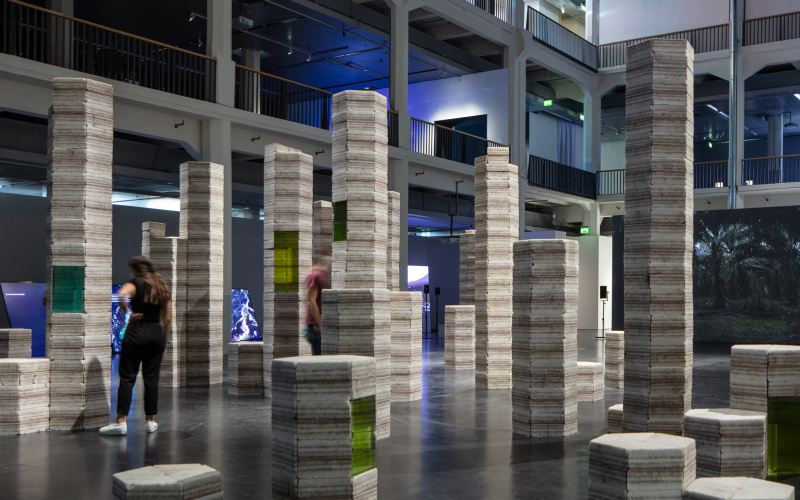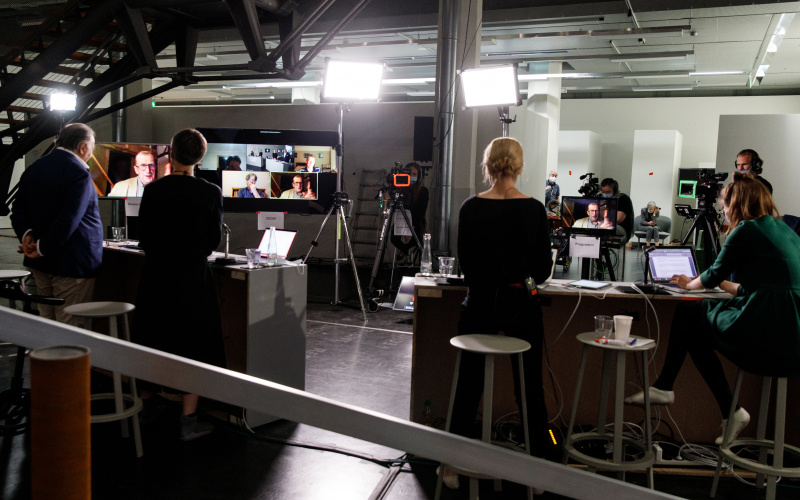"But this life is not long enough..."
Notes on “Of Gods and Scripts Around the Mediterranean – Symposium in memoriam Friedrich Kittler” During his lifetime Friedrich Kittler’s works were the subjects of fierce debates that ranged far beyond the horizon of academic teaching and self-teaching. When the media philosopher died in Berlin on October 11th of last year (in 2009 he had stated, “I’d rather be just a philosopher of course, but things aren’t so simple anymore”), the scientific bad boy image was still prominent in the news announcements and obituaries surrounding his death. His friend Jürgen Kaube wrote in the FAZ obituary of the “thirteen points of advice” that should be considered. “They didn’t even want to give him his doctorate when he was Assistant Professor in Freiburg,” in 1982. In short: the debate over Friedrich Adolf Kittler’s dissertation Aufschreibesysteme 1800/1900 became just as legendary as the work itself – so much so that others also read thirteen points out of the original nine points - and as a result Kittler turned his back on literary science. Emerging from Freiburg’s 1970s poststructuralist German scholars, the engineer / computer programmer took self learning to its highest heights in the 1980s and, finally, in his later years, became the image of a 19th-century German professor, completely dedicated to the mythology of Greek Antiquity. His program was often described by his thesis of the “expulsion of the liberal spirit from the liberal arts” (“Austreibung des Geistes aus den Geisteswissenschaften”); in 2001 he wrote: “How is it that people in Europe love learning but do not learn to love?” Friedrich Kittler’s theses, his programs, claims, methods, techniques, his lively eclecticism, and his exuberant intellectualism, shaped (at least) a whole generation of researchers, artists, and those who recognized liberal spirits. Some time before his passing, Kittler had already planned his exit from the academic stage – with a last symposium. This was meant to be a shotgun blast, his (scientific) legacy. The title he gave it: Of Gods and Scripts Around the Mediterranean. At this event, once again all of the lines that he cast in the fields of media studies, linguistics, cultural studies and literature were meant to come together, to cross paths, and open up perspectives. This event took place not long ago at ZKM | Karlsruhe (Fri–Sat, 19–20 October 2012) in a highly impressive way, with the supplementary title: In memoriam Friedrich Kittler. The ZKM_Media Theater offered the ideal location for the symposium’s venue and the dim blue light recalled Gottfried Benn, whom Kittler so admired, and his love of this color: “Blue, what pleasure, what pure adventure …”. At the same time the parallel-running exhibition at ZKM “Sound Art. Sound as a Medium of Art” corresponded uncannily with the work and life of the sound-engineer and rock music lover, Kittler. Noises, sound fragments, language, these ultimately also shaped Kittler’s cosmos. Kittler spoke once of the “gods who live in machines.” The quotation could hardly be more apt in connecting the content of the first and second symposium days. While Friday’s theme investigated ancient Greece, the mythological world of classical Antiquity, and the emergence of scripts and language, the peculiarities of cuneiform writing and hieroglyphs, the development of vowels, consonants in the Mediterranean area (and beyond, from that perspective), Saturday’s theme was the transition from the twentieth to the twenty-first century and the new gods, the “Machines, machines [that] conquered the Earth’s crust” (Kurt Pinthus, Die Überfülle des Erlebens; 1925). Gods were what ultimately fascinated Kittler for many years and inspired his creativity. Wasn’t he himself the kind of “priest in a white laboratory coat” whose existence he claimed was responsible for animating and blessing the inner life of machines? One question that the symposium left unanswered (or had to leave unanswered) was: Is it possible to speak in a way that is not fragmentary about Kittler, whose methods were so fundamentally shaped by the characteristic of fragmentarism? A mixture of “precision and messiness,” commented Tania Hron, cultural studies scholar and a long-term assistant to Kittler, described his unique system, his technique. Consequently, this comprised only notes, exclusively fragments. “Why was Jesus crucified?” Friends of Kittler reported of his passionate interest, during his last years, in the history of (early) Christianity. Kittler’s original thesis casts Jesus as a “media striker,” as a “media rebel,” and his murderers are the rabbis, the literate men. He makes the Torah readable for poor people, and shifts them away from the idea of “cryptography,” and writes vowels. Jesus was thus a “heretical rabbi, who puts vowels to / vocalizes Hebrew” and therefore also makes the Torah understandable / readable for the Aramaeans; this is the language of the poor. Jesus reads Hebrew; he is the “Hebrew-literate prodigy” – there is no need for the scribe any longer; only “idiots remain with the consonants.” The Berlin cultural studies scholar Gerhard Scharbert collects the pieces of Kittler’s fragmented literary estate into a complexity and forms a grisaille window of great transparency and beauty in the blue-light saturated media theater. He does so above all in Kittler’s characteristic style of being “enraptured” through the love of the subject, which also knows and tolerates “speculation, […] errors, autodidactic exaggeration and unsubstantiated claims” (Kaube). Ludwig Morenz elaborates: “Misunderstandings often lead to cultural promotion!” which is as true today as it was then, one might add. The creation of language, written language, the alphabet, states the Egypt scholar from Bonn, Morenz, is in fact only conceivable as multi-causational, which was an important result of the discussions on the first day. Not one or two aspects, but a whole mix of the most diverse historical, economic, geographical, political, religious, and cultural aspects had a constitutive effect. “Through thought, a new language,” describes the cultural studies scholar Peter Berz of the Humboldt University in Berlin, the way in which Kittler himself forms (with and in regard to Martin Heidegger) a “mixture from which the unpredictable emerges” and which one must be able to follow when speaking “about things from ideas” (Siegfried Zielinski; University of the Arts, Berlin). “A literary science professor is worthless if he has never himself written poetry,” is a statement that is likewise attributed to Kittler. A media archeologist is worthless, if he can’t bury himself in his medium, one might think as a correlate, with regard to Friedrich Kittler’s passionate synthesizer creations. He bought parts from all over the world, had building instructions sent to him, screwed, soldered, glued parts together. Sebastian Döring (media archaeologist, Berlin) and Jan-Peter E.R. Sonntag (artist, composer, theorist, Berlin) pursued the question: Can Kittler’s synthesizer be read like a black box? How is the anatomy of the five magic boxes created? In film and sound installation, it is asked what writing hidden within the devices could be read, for it is forbidden for them to sound. The German Literature Archive Marbach, the “schwäbisch-deutsche Gedächtnisanstalt,” does not allow it. The resulting sound could, however, never reproduce that of the late 1970s’ and early 1980s’ early synthesizer generation; these represent an analog wonderland, always “off pitch.” The slightest change in room temperature or humidity have an effect on the sound. What ultimately comprises Friedrich Kittler’s legacy? What does it consist of, essentially? Along with the writing he left behind, excerpted sentences, notes jotted down, circuit diagrams, chess sketches on TypoScripts, he leaves behind above all the hardware / source code: sound tapes, hard drives, diskettes, CD-ROMs, note card boxes. Much research on the unwritten / yet to be written books was contained in his system, which could only be entirely understood by him (precision vs. messiness). Over many years he researched color ascription in literature: “But this life is not long enough” [F. Kittler]. From the nicotine-yellow-clouded legacy, suddenly something personal: pictures of his mother, father, and brother. School grade report. Friedrich Adolf Kittler: the saxophonist of a school band. Paul Feigelfeld, information scientist and cultural studies scholar in Berlin, told of Kittler’s panicked nightly calls. Once it was a melted graphics card (in fact one of the highly appraised “KATASTROPHE(N)!”), once a problem that could be easily resolved by turning the computer off and back on again. A solution that one can repeat until either the device, or the operator, gives up (c.f. Synthesis by Peter Weibel, 1967). Feigelfeld creates an image, illustrates the memory: Kittler at his Linux machine all night, smoking, in his office – how he organized, wrote, programmed: “The way that Kittler wrote programs is not done by anyone anymore: without a programming environment and the like, often weeks-long” [P. Feigelfeld]. In his “manic ecstasy of signifiers” the User_Ich goes to the borders of his hardware, his board (a “lively, epistemological thing”). And each Thursday in his office he gathered around him the followers, the youths, to smoke, experiment, discuss mathematical problems and Greek gods, the radio operator Guderian, and the color theories of Goethe. Kittler was present, manically so, whether he wanted it or not. “Being, as it was sent by Europa, was the state of being constantly present – what is transient, such as roses, butterflies, and people, appeared to be nothing in light of him,” he wrote approximately 10 years ago. People do indeed come and go. What remains? First, the nostalgic memory of this symposium. And how Erika Kittler laughed so beautifully when she tested the sound installation “Rain Dance” by Paul DeMarinisso, using her umbrella, on the ZKM square. Sometimes a lifetime is not enough. Sven Gringmuth studied media studies, history, social pedagogy, and social studies at the University of Siegen. He wrote his dissertation on the principle semantics in Diedrich Diederichsen’s early works and he works at the University of Siegen as teaching staff for special tasks in the area of new German literary science and cultural science.
Text: Sven Gringmuth
[Quote by F. Kittler] This comes from his long-term assistant Tania Hron, who reported it in the context of a symposium lecture. Kittler was said to have sighed, when looking upon his comprehensive note card system, that he had still wanted to write so many books, put so much to paper, “But this life is not long enough …”.
[Quote P. Feigelfeld] Paul Feigelfeld, information and cultural scientist in Berlin.
News Type
Related Tags
News Category
- take a look… behind the scenes of ZKM



